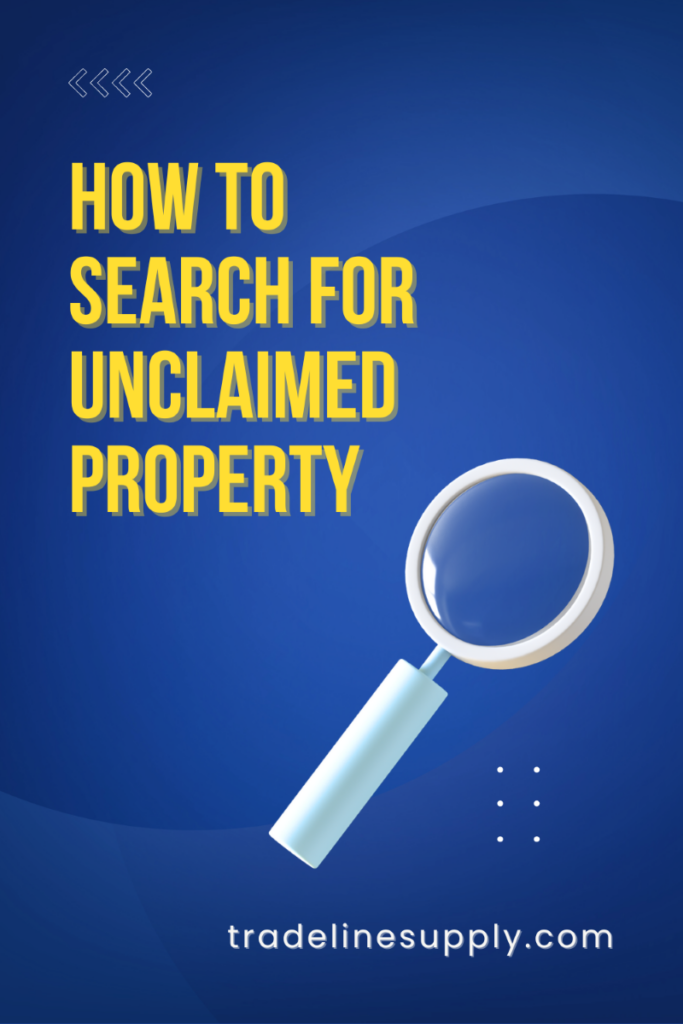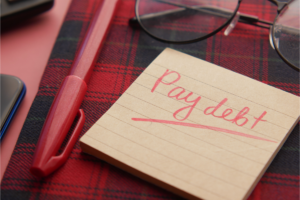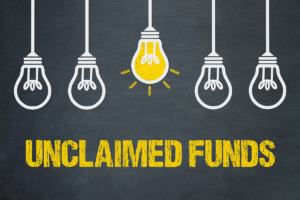How to Search for Unclaimed Property

6 Reasons Why Having a Good Credit Score Matters
07/16/2023
Master Credit-Building in Less Than 7 Minutes
07/27/2023 Everyone loves a financial windfall. Unclaimed property in the form of a cash payment might give your financial situation a boost. Not everyone will uncover unclaimed property, but the potential to reclaim funds you are owed makes it worth taking a look around.
Everyone loves a financial windfall. Unclaimed property in the form of a cash payment might give your financial situation a boost. Not everyone will uncover unclaimed property, but the potential to reclaim funds you are owed makes it worth taking a look around.
The good news is that it’s easy to search for unclaimed property. Let’s explore how to search for unclaimed property.
What Is Unclaimed Property?
Unclaimed property is money that is yours, but through a twist of fate, did not make it to your bank account when originally issued. Or you simply neglected to use a particular financial account for an extended period of time and the account was closed with a balance.
At some point, the financial institution is required to hand over information about the funds to a state agency. As an individual, you can search for unclaimed property and collect it. However, you’ll have to take the initiative to search for these funds in order to reclaim them.
Types of Unclaimed Property
Unclaimed property comes in many different forms. It’s relatively easy for your property to go unclaimed at some point. Some of the types of unclaimed property include:
- Insurance checks
 Government refunds
Government refunds- Checking accounts
- Stocks
- Savings accounts
- Refunds
- Uncashed paychecks
- Security deposits from phone or utility companies
- Safe deposit box contents
Ultimately, unclaimed property is any money that didn’t make it to you. When the state is given your unclaimed property, it may try to contact you about the situation.
Why You Should Look For Unclaimed Property
Unclaimed property includes funds that are rightfully yours. Since the unclaimed property is something that has fallen through the cracks of life, you might not even know you are owed the funds. With that, it makes sense to look for unclaimed property.
If you do find some unclaimed property, you can use the funds to make progress toward your financial goals. Depending on your situation, you might come across thousands of dollars in unclaimed funds. Anyone can appreciate how thousands of dollars in free money would provide a lift to your financial situation.
If you don’t find any unclaimed property, you’ll at least know that you made an effort to find any hidden funds waiting for you.
Avoid Unclaimed Property Scams

The downside of seeking out unclaimed property is the potential to run into a scam. Unfortunately, unclaimed property scams are plentiful. The goal of the scam is to steal your identity information by promising to return a large sum of money.
In order to avoid scams, look for unclaimed property through your state’s official website. If someone contacts you about unclaimed property, head straight to your state’s website. Any unclaimed property should be accounted for in this database. By sticking with trusted websites, you can avoid accidentally handing over your information to bad actors.
Additionally, avoid working with a third party to recover unclaimed property. It’s completely free to search for unclaimed property through your state’s website. Instead of opening yourself to a scam, run the search for free by yourself.
How to Look For Unclaimed Property
If you are ready to look for unclaimed property, here are the steps you’ll need to take.
Visit Your State’s Database
Every state has a slightly different method of handling unclaimed property. Typically, the state provides access to a database of unclaimed property through a straightforward website.
Look for an official state government website to get started.
Another option is to head to Missing Money. The database is endorsed by multiple states to help you find unclaimed funds.
Enter Your Information
When you find the database, you’ll likely see an option to search for your unclaimed property. Start the search with your first and last name. In some states, you’ll have the option to narrow your search further with your middle name, ZIP code, or city. In other states, you can narrow the search by providing your previous addresses.
If your name appears in the search, drill into the information. Most states won’t give you all of the details through an online database. However, you can confirm whether or not the unclaimed funds are yours to claim.
Claim the Property
Once you’ve determined you have unclaimed property, it’s time to claim it. The exact details of the process will vary based on your state. But in general, you’ll submit a claim. Be prepared to provide information about your identity and property ownership. Although the paperwork might be a tedious hurdle, the state needs to confirm the unclaimed property does belong to you.
What to Do With Unclaimed Property

Unclaimed property can range from a small surprise to a major windfall. Either way, this free money is likely to brighten your day. Beyond putting a big smile on your face, the recovered property can help you work toward big financial goals. If you aren’t sure what to do with your recovered cash, consider the following options.
Pay Off Your Debt
Debt is a drain on your financial situation. When minimum monthly debt payments are eating up a big portion of your income, it can be a challenge to build a solid financial foundation. The solution is to pay down the debt.
The money you recover might be enough to make progress on your debt repayment process. But if you have multiple debts, choosing the best strategy isn’t always easy. If you aren’t sure which debts to tackle, consider the snowball and avalanche strategies.
The snowball method involves paying off debts in order from the smallest balance to the highest balance. With each debt you eliminate, you can add its monthly payment to your debt snowball for the next largest debt. The growing snowball can help you tackle bigger debts.
In contrast, the avalanche method focuses on paying off debts based on the attached interest rates. You’ll start making extra payments to the debt with the highest interest rate first and work your way down to the debt with the lowest interest rate.
Technically, the avalanche method is the most mathematically efficient. However, the snowball method can give you smaller wins upfront to gain momentum for your debt repayment journey. Neither option is better than the other. Instead, you’ll need to decide which option is the best fit for your situation.
Build Your Emergency Fund
If you don’t have any high-interest debt weighing down your financial situation, then consider boosting your emergency fund. An emergency fund is a stash of cash specifically designed to help you get through unexpected situations. For example, if your vehicle needs a major repair or you lose your job, you can rely on your emergency fund.
Many experts recommend storing three to six months’ worth of expenses in an emergency fund. For example, if you normally spend $2,000 per month, you might store $6,000 to $12,000 in an emergency fund. The reality is that you never know what unexpected costs life will throw your way. If you have an opportunity to build in a financial cushion, it might provide a lifeline during a future emergency.
Fund a Splurge
A windfall puts extra money in your pocket, which might make you feel like spending more. There’s nothing wrong with a splurge, especially if you are already on solid financial footing. If you still have debts to repay or lack any savings, consider using a least a portion of the funds to reach those financial goals before opting to splurge.
If you choose to splurge, consider sticking with items already on your want list. For example, you might finally get the purse you’ve been eyeing or take your significant other out to the restaurant you’ve been wanting to try.
A splurge purchase can be a worthwhile way to treat yourself after finding unclaimed money.
Invest In Your Future
Saving money is important. But investing is another key element to building a solid financial future. If you’ve been waiting to invest, your recovered funds might give you an extra reason to get started.
As you build an investment strategy, consider your short-term and long-term financial goals. For example, saving for a home purchase in the next two years would involve a short-term investment outlook. In contrast, saving for retirement is a long-term financial goal that might take decades to achieve.
Investors must decide for themselves what their risk tolerance is and how this ties to their goals. Typically, a short timeline requires a less risky investment portfolio. Investors with longer timelines might choose to take on more risk.
If you aren’t sure where to get started on investing, consider finding free resources online or working with a financial advisor.
Build Your Credit
Your credit score is a three-digit number that can have a big impact on your financial situation. Building credit isn’t always easy. But an influx of cash might help you give your credit score a lift.
For example, you could set aside the newfound funds to make on-time payments to your debts. Within your FICO score, your on-time payments represent 35% of your score. As the most important credit scoring factor, on-time payments are a priority for anyone who wants to build credit.
If you want help building a record of on-time payments, consider taking out a credit-builder loan or secured credit card. Both give you an opportunity to build a history of on-time payments.
The Bottom Line
Life is messy. Sometimes the funds you are owed don’t arrive as planned. With that, millions of dollars of unclaimed funds are sitting in databases across the country. Many people don’t realize that recovering these unclaimed funds is an option. But now you know how to track down unclaimed funds for yourself.
It never hurts to take a look at your state’s database. You might uncover a treasure trove waiting for your discovery.





2 Comments
Hello my husband and I are more than interested in all you have to offer. I have 0 credit and his is bad credit. I am a victim of Identity Theft and fraud my credit bureaus we’re frozen. There is a lot we would like to share with you/ colleague or referrals even.
Thank you
W and SM
Hello! If you’d like to purchase tradelines you can find them here, or click on “Buy Tradelines” at the top of the page: https://tradelinesupply.com/pricing/. Just make sure to remove any credit freezes, locks, or fraud alerts first to ensure that tradelines can post to your credit report: https://tradelinesupply.com/can-i-still-add-tradelines-if-I-have-fraud-alerts-or-credit-freezes-on-my-credit-file/.
If you’re interested in our affiliate program, sign up here: https://tradelinesupply.com/affiliates/#affiliate-program
Browse our articles and FAQs for more info, and feel free to give us a call at 619-255-9588 and our support team will assist you.